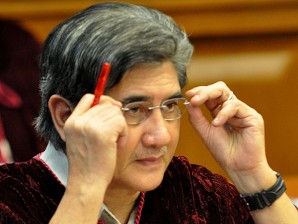
“The Philippines is a democratic and republican state. Sovereignty resides in the people and all government emanates from them. If we are serious about the sustainable development of our democracy as we are about our economy, transparency and open government must be at its core,” said Sen. Gregorio Honasan, one of the sponsors of the bill. INQUIRER/RICHARD REYES
The freedom of information (FOI) bill has hurdled its last obstacle in the Senate and was passed Monday on third and final reading.
The passage of Senate Bill No. 3208, also known as the People’s Ownership of Government Information or Pogi Bill, allows the government to adopt a policy of full public disclosure of transactions involving the public interest, except for information relating to national security and defense that may imperil the country.
The measure was passed on third and final reading with 17 votes for, none against, and no abstentions.
In the House of Representatives, the debates on the FOI bill could begin Tuesday, after the sponsorship speech of Eastern Samar Rep. Ben Evardone who said that the other coauthors may opt to deliver speeches before interpellations could start.
Deputy Speaker Lorenzo Tañada, a main proponent of the measure, said he hoped President Aquino would certify the bill as urgent and that the House would show the same political will as the Senate and pass the bill soon.
The Pogi Bill provides mechanisms for the mandatory disclosure of government information, both automatic and upon request, and penalties for denying such information without due cause.
The bill provides that information on projects, transactions, documents and records pertaining to the public interest be made public by being posted on government websites, and preferably translated into major Filipino dialects for easier comprehension.
15-day period
The measure provides that government agencies grant access to information within 15 days after receiving a request for it. Government agencies must also explain before the courts why it would not release requested information.
Aside from matters of national security, also exempt from mandatory disclosure are information pertaining to foreign policy, records of minutes, advice or opinions expressed during decision-making or policy formulation proceedings of all branches of government, and requests for personal information on natural persons, unless they consent in writing to the disclosure.
“The Philippines is a democratic and republican state. Sovereignty resides in the people and all government emanates from them. If we are serious about the sustainable development of our democracy as we are about our economy, transparency and open government must be at its core,” said Sen. Gregorio Honasan, one of the sponsors of the bill. His cosponsors were Senators Loren Legarda, Alan Peter Cayetano, Antonio Trillanes IV and Franklin Drilon.
RH bill took precedence
The House was unable to tackle the bill yesterday because of its third reading vote on the reproductive health (RH) bill.
Tañada hoped the President would give a speech endorsing the measure as urgent, especially since it had been incorporated with suggestions from the Palace.
As to whether the FOI bill could be put to a second reading vote in the House soon, Evardone said it would depend on how many lawmakers challenged it or proposed amendments.
Tañada earlier said that with several lawmakers vowing to introduce controversial amendments, such as a right of reply provision, the earliest the bill could be put to a second reading vote would be when Congress resumes session in January.
The last session day for Congress this year is Wednesday.